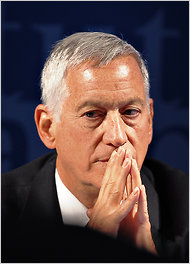A New Voice of America for the Age of Twitter
When Walter Isaacson championed Voice of America’s decision to shut down its shortwave radio broadcasts to China — and shift those funds to the Internet, cellphones and other forms of digital media — he viewed it as the sensible updating of a propaganda playbook dating from the cold war. But nothing is simple in the world of government broadcasting. Representative Dana Rohrabacher, a California Republican and staunch critic of China, condemned the move, saying it would deprive Chinese listeners of unfiltered news. It amounted, he said, to an American retreat in the face of Beijing’s growing global influence. “Who knew shortwave in China was a land mine?” said Mr. Isaacson, a onetime head of CNN who is chairman of the Broadcasting Board of Governors, which oversees Voice of America and its four sister networks.
With the Obama administration embarking on a fundamental overhaul of Voice of America and other official broadcasters — one that seeks to adapt their traditional diplomatic missions to the era of Facebook and Twitter — Mr. Rohrabacher’s response could be a foretaste of battles to come. As part of its yearlong review, Mr. Isaacson’s board is seeking ways to streamline and modernize Voice of America and its sister networks: Radio Free Europe, Radio Free Asia, Alhurra, and Radio and TV Martí. Each service has its protectors in Congress — Cuban-American lawmakers fiercely defend Radio Martí, for example — and they are likely to view any change as a threat. “It’s going to take some tilling of the ground,” acknowledged Mr. Isaacson, who brings the perspective of both a media executive and an aspiring diplomat (he has been in line for senior jobs at the State Department).
While the need for the United States to get its message across to an often hostile world is greater than ever, Mr. Isaacson said, digital technology risks turning these services into relics of a bygone era, when dissidents in closed societies huddled over their transistor radios for scraps of information from the West. To be sure, the broadcasters have made significant strides. Voice of America is inviting listeners to file reports about the uprisings in Bahrain on Facebook, while Radio Free Asia is aggressively developing technology to circumvent firewalls that the Chinese government puts up to block its transmissions.

